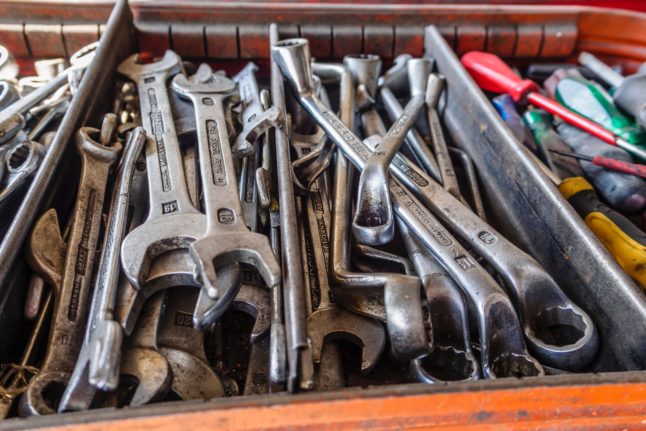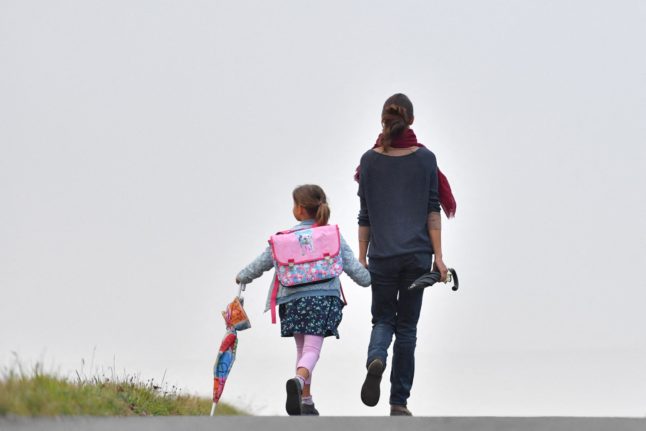How do I find a reliable plumber and avoid getting scammed?
First, try to stick with word-of-mouth if you can. Contact trusted individuals or resources, like your neighbours and friends, or foreigner-oriented Facebook groups for your area (ex. “American Expats in Paris”). This will help you find a more reliable plumber. If this is not an option for you, try “Pages Jaunes” (France’s ‘Yellow Pages’) to see reviews and plumbers (plomberie) in your area.
Next, educate yourself on standard rates. If the situation is not an emergency, try to compare multiple plumbers to make sure the prices are in the correct range.
Finally, always Google the name of the plumber you’ll be working with – this will help inform you as to whether anyone else has had a particularly positive (or negative) experience with them – and check that the company has a SIRET number.
This number should be on the work estimate (devis). You can also check them out online at societe.com. If you want to be extra careful you can also ask to see their carte artisan BTP (craftsman card).
READ MORE: What is a SIRET number and why is it crucial when hiring French tradesmen?
Who is responsible for paying for work?
If you own the property, you are typically the one who is responsible for financing the plumbing expenses.
However if you’re in a shared building, you must determine the cause and location of the leak. If you cannot find the origin of the leak, you may need a plumber to come and locate it and provide you with an estimate. You can use this estimate when communicating with insurance, should the necessity arise.
If you are a renter, the situation is a bit more complicated. Most of the time, water damage should be the landlord’s responsibility, but there are exceptions.
The landlord is obliged to carry out major repairs (ex. Natural disaster, serious plumbing issues) that are necessary for the maintenance and normal upkeep of the rented premises (as per, Article 6C of the law of July 6, 1989). The tenant, however, is expected to carry out routine maintenance, and minor repairs are also to be paid by the tenant. If the problem is the result of the tenant failing to maintain the property, then it will be the tenant’s responsibility to cover the cost of the repair.
Legally speaking, it is also the tenant’s responsibility to get the boiler serviced once a year, as well as to maintain the faucets and joints, and to avoid clogging the pipes.
READ MORE: Assurance habitation: How to get home insurance in France
If you end up in dispute with your landlord over costs, you can always reach out to ADIL, the national Housing Association which offers free legal advice for housing issues in France.
What happens if the leak is coming from my neighbour’s property?
Both you and your neighbour should contact your respective housing insurance companies and file the ‘sinistre’ (damage) with them.
If you both agree on the facts you can file an amiable (in a friendly fashion), then matters are much more simple and you will not have to go through the back-and-forth of determining fault.
If having a friendly process is not possible, be sure to get an expert to assert where the leak is coming from and file this with your insurance company.
As always, keep evidence (lists and photographs) of the damage. Keep in mind that many insurance providers have a limited number of days after the start of the damage that you can file. Better to do it sooner than later, partially because, as with most administrative processes in France, it might take a bit of time.
Vocab
Plumbing has its own technical vocabulary so here are some words and phrases that you’re likely to need;
Hello, I have a leak in my home. I would like to request that a plumber come to give me an estimate of the damage and cost for repairs – Bonjour, j’ai une fuite chez moi. Je voudrais demander qu’un plombier vienne me donner une estimation des dégâts et du coût de la réparation.
It is an emergency: C’est une urgence
I have no hot water: Je n’ai pas d’eau chaude
The boiler has stopped working: La chaudière ne fonctionne plus.
I cannot turn my tap off: Je ne peux pas arrêter le robinet.
The toilet is leaking: Mes toilettes fuient.
The toilet won’t flush/ is clogged: Mes toilettes sont bouchées
There is a bad smell coming from my septic tank: Il y a un mauvaise odeur provenant de ma fosse septique
I would like to get my electricity / boiler safety checked: Je souhaiterais une vérification de la sécurité de mon installation électrique / de ma chaudière
I can smell gas: Ca sent le gaz
My washing machine has broken: Ma machine a laver est cassée
Can you come immediately? Est-ce que vous pouvez venir tout de suite?
When can you come? Quand est-ce que vous pouvez venir?
How long will it take? Combien de temps cela prendra-t-il ?
How much do you charge? Quels sont vos prix? / Comment cela va-t-il coûter?
How can I pay you? Comment je peux vous payer ?
Here are the key French vocabulary words for all things plumbing-related:
Dishwasher – Lave vaisselle
Bath – Baignoire
Shower – Douche
Kitchen Sink – Évier
Cupboard – Placard
Water meter – Compteur d’eau
The Septic Tank – La fosse septique
A leak – Une fuite
Bathroom sink – Le lavabo
The toilet – La toilette
Clogged – Bouché
To overflow – Déborder
A bad smell – Une mauvaise odeur
The flexible rotating tool used to unclog a pipe (and also the word for ferret in French) – Furet
Water damage – Dégât des eaux
The damage – Le sinistre
And finally, do you know the French phrase Sourire du plombier? No, it’s not a cheerful plumber, it’s the phrase used in French for when a man bends down and his trouser waistband falls down, revealing either his underwear or the top of his buttocks. In English it’s builder’s bum, in French ‘plumber’s smile’.



 Please whitelist us to continue reading.
Please whitelist us to continue reading.
Well, in Ebglish it may be builder’s bum, but in the States it’s plumber’s crack. 😂